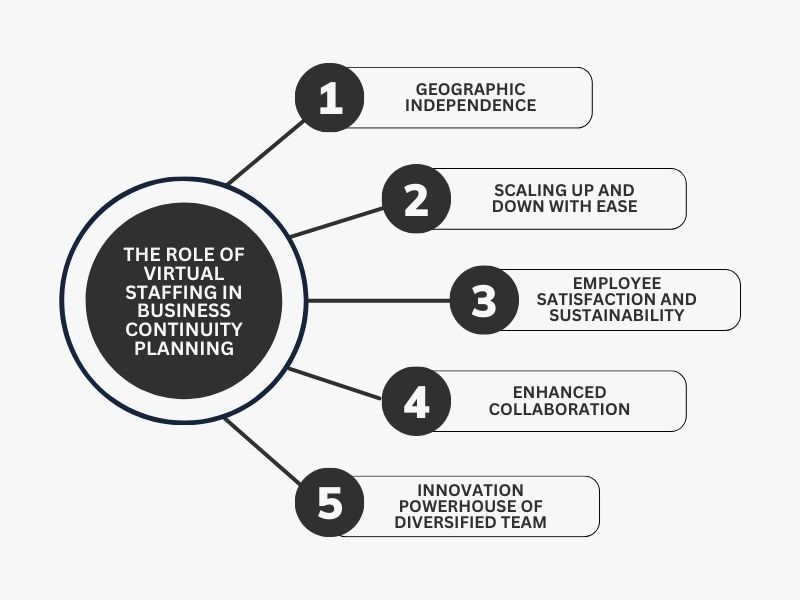The business world is a whirlwind of challenges and opportunities, demanding constant adaptation. From economic shifts that ripple through industries to technological disruptions that redefine the way we work, organizations must embody agility and resilience to not just survive but thrive in this ever-changing environment. While many strategies are considered for managing change, one often underestimated tool with significant power is virtual staffing.
Although traditional business continuity planning is essential for organizational preparedness, incorporating virtual staffing into the strategy can elevate it significantly, offering distinct advantages in managing disruptions and maintaining seamless operations.
In today’s world where everything is connected, the idea of a remote workforce is not just a trend anymore but an important strategy for business. One of the most trusted business outsourcing staffing companies where you can find reliable and dedicated virtual teams is MidAtlantic Business Outsource Staffing.
Virtual staffing, which means having employees working from different locations, is key to adapting to change and ensuring uninterrupted operations. In this article, we will take a closer look at how virtual staffing contributes to managing disruptions and setting up a foundation for long-term success. Here are five key roles virtual staffing plays in business continuity:

Geographic Independence
Virtual staffing stands out as a modern solution that transcends traditional boundaries. Unlike traditional staffing models, virtual teams can effortlessly operate across borders and time zones, allowing businesses to tap into a wider talent pool and increase operational flexibility. By strategically distributing the workforce across different locations, companies can effectively minimize the impact of localized disruptions.
This becomes particularly evident during unforeseen events such as natural disasters or regional crises, where the seamless continuation of operations is crucial. In such scenarios, virtual staffing allows employees to smoothly transition to remote work from areas unaffected by the incident, ensuring uninterrupted productivity and service delivery.
Consequently, businesses equipped with virtual staffing are not only better prepared to manage challenges but also strengthen business continuity strategies, enabling organizations to adapt and thrive in the face of unexpected challenges.
Scaling up and down with ease
Virtual teams can provide companies with the capacity to swiftly adjust the size of their workforce based on the demands of the situation. This flexibility serves as a strategic advantage, particularly during difficult times, allowing companies to adjust their resources in response to changing market conditions and unexpected challenges.
In times of economic downturns, sudden changes in consumer behavior, or unforeseen disruptions, and the ability to adjust personnel levels allows companies to remain flexible and resilient when dealing with turbulent business environments.
Leveraging virtual teams enables businesses to effectively manage fluctuations in their workforce, optimizing operational efficiency and positioning themselves for sustainable success in times of uncertainty.
Employee Satisfaction and Sustainability
Virtual staffing offers numerous benefits that go beyond just keeping business operations running seamlessly. These advantages are important for both employees and employers. According to Forbes, virtual work can lead to happier employees, a better balance between work and personal life, and a decrease in environmental impact by reducing the need for commuting.
Now that employees are fully remote, those social costs for employees are gone, and as a result, friction in businesses has been reduced significantly. Employees now have more control over the integration of their professional and personal lives and become significantly more productive.
In today’s competitive job market, these benefits of virtual staffing are essential for success. By creating a workspace atmosphere where employees feel empowered and balanced, virtual staffing not only boosts morale but also increases productivity. This combination of employee satisfaction and streamlined operations provides companies with a significant advantage in achieving success in any industry.
Enhanced Collaboration
Contrary to the misconception of isolation, virtual teams frequently foster stronger communication and collaboration due to reliance on clear communication tools and documented processes. The very essence of collaboration within teams serves as a driving force for innovation and problem-solving, particularly when confronted with unexpected hurdles and challenges.
This heightened collaborative spirit not only boosts productivity but also creates a space conducive to creative thinking and adaptive responses to challenges, thereby contributing significantly to the overall success and resilience of the team and the company.
Innovation Powerhouse of Diversified Team
In the fast-paced world of business today, virtual teams are like hubs for ideas and smart solutions. They bring together people from various backgrounds and perspectives to come up with fresh ideas and innovative solutions. Particularly in challenging times, when companies confront complex challenges demanding innovative solutions, the collaboration of individuals in remote teams becomes a priceless advantage. This collaborative approach, using tools like video calls and messaging, helps generate creative ideas and pushes companies forward in a rapidly changing world.
In conclusion, virtual staffing is very important for businesses nowadays, especially when you’re planning for unexpected events that could disrupt your operations. It’s like having a flexible team that can work from anywhere, not just in one office. This flexibility is very helpful because it means companies can easily adjust how many people they have working at any given time, depending on what they need.
Moreover, virtual staffing helps companies be more resilient. By hiring people from all parts of the world, businesses can spread out talents and continue operations even when confronted with unexpected risks like natural disasters affecting everyone in one location. This way, even if there’s a problem in one place, the work can still keep going in other areas.
By embracing virtual staffing and integrating it into your business continuity planning, you’re equipping your organization with the agility and resilience needed to thrive in the face of constant change. Remember, the future is uncertain, but with an adaptable workforce and strategic business continuity plan, your business can weather any storm.
To learn more about virtual or outsourced staffing, visit MidAtlantic Business Outsource Staffing today.




